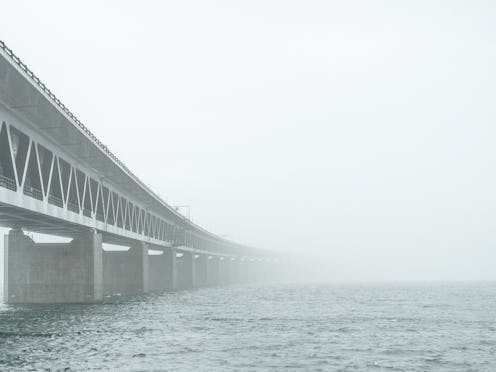News
The One Issue Everyone Needs To Be Aware Of
If you're an avid John Oliver fan, you've probably seen his mostly hilarious but also slightly terrifying segment on American infrastructure. It might seem a little alarmist, what with its depiction of crumbling dams, deadly potholes, and collapsing bridges. But the thing is that Oliver is absolutely right. For water infrastructure alone, estimates suggest that over one trillion dollars are needed to overhaul the failing system, and the American Society of Civil Engineers only gave the country's physical foundation an overall D+ rating. Infrastructure is one of the most pressing issues of this election cycle, but there's one serious problem — nobody's talking about it.
Unlike other political issues, such as the economy or foreign relations, infrastructure presents neither a feeling of personal impact nor fear for most people. Yet every American is subject to the problems facing the country's infrastructure — it's one of the only truly ubiquitous issues which impact every single person in the country. And now that disasters like the Flint water crisis could be spreading, a major investment in American infrastructure is absolutely necessary for the next presidency. It's crucial that informed voters know each candidate's position on infrastructure reform. Here's what they have to say about rebuilding the nation.
Donald Trump
With most of his policy proposals, Trump likes to say that he'll do something, and then refuse to expound on his declaration. His position on infrastructure is no different. On multiple occasions, including one section in his book Crippled America , he details the United States' problematic infrastructure, but declines to give a projection on the cost, or on any specific plans to achieve his goals. The lack of a concrete plan doesn't inspire too much confidence, but Trump does seem dedicated to at least keeping infrastructure in the national conversation.
Ted Cruz
Cruz does not have a infrastructure plan listed on his website, which should be enough reason not to support him as a candidate. He does detail some plans for energy progress, including oil, natural gas, and ethanol investments, but that's it in the way of infrastructure policy proposals.
Marco Rubio
Rubio's proposed transportation plan predictably relies on removing power from the federal government and allowing states to take up the mantle on improving infrastructure. According to his website, he also plans to drastically cut the federal gasoline tax and "remove barriers to public-private partnership," presumably so that states can get private companies to finance roads.
John Kasich
Unlike Rubio, Kasich doesn't want to cut the gas tax, but he does want to give it back to the states so they can invest it themselves. Kasich also advocates for the Keystone XL pipeline as an energy source, but other than that, there's no rhetoric addressing the nation's systemic infrastructure problems.
Hillary Clinton
Clinton had previously released a plan on her website proposing a $275 billion infrastructure investment over five years, but her tack changed dramatically during last week's debate in Flint, when she promised to remove all lead not only from water systems, but from homes and soil as well.
There's no telling how much that plan could cost, and Clinton didn't present it very thoroughly in the debate, but according to Vox, it could have long-term benefits like a reduction in crime and an increase in academic achievement. If Clinton can pull together a comprehensive proposal for accomplishing her claim, it might be a seriously compelling reason to support her.
Bernie Sanders
Sanders has been the most consistent and proactive candidate so far in this election cycle when it comes to infrastructure reform. In January, Sanders filed a bill with the Senate to spend $1 trillion on improving the country's infrastructure. But it didn't come out of nowhere — Sanders has stayed exactly on message about infrastructure since the beginning of his campaign. It shows that Sanders has follow-through — an important characteristic for him to project, considering his other big campaign promises.
These positions are vital to understand, especially for young voters, because a solid infrastructure is how the United States will continue to thrive in the 21st century.
